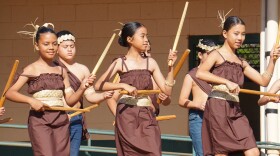When forces of Kamehameha I conquered Oʻahu in 1796, at least one Black person was already living on the island, according to the National Park Service. But the history of African Americans in Hawaiʻi is less well-known than some other strands of local history.
As part of our continuing project with the University of Hawaiʻi at Mānoa's Center for Oral History, we're bringing some voices to share part of that history.
Ethnic studies professor Ethan Caldwell has the story of two Black people who moved to Hawaiʻi in the 1940s and found a community.
Ernest Golden was born on May 21, 1923, in Athens, Georgia. He left Athens and the South in 1942 for a civil service job in Hawaiʻi and stayed afterward in the airport porter industry. Golden shares his thoughts on the challenges of building community through business and assimilation.

Golden: One reason why we didn't get into business, because we didn't have one area where Blacks had gathered to the point where it was conducive to have a business, and this was intentional. I often criticized us for that. We're just so afraid of creating a ghetto here. And I've often tried to find a name, a term to apply to this, and I use assimilation, assimilating into the community, we try to lose our identity into the Hawaiian community. And I think we tried to blend, and because we tried to blend, we lost our identity. And losing our identity, we lost any possibility of having any strong business needs, the demands that come about when you have a group of people living in an area where there’s a commonality of interest. There was little or no social entertainment and loss of culture, loss of any financial clout, that sort of thing. But some of us got together and started some sort of social life for ourselves. Ten of us got together and created what was called the Ten Bachelors Club. And this was quite a successful social club. And all of us were single guys. Finally, one of us got married and I think that was sort of the wedge that was driven into the Ten Bachelors Club, and so we finally dissipated. We all finally got married, I guess once we got married, there was no need to be having the club or anything like that.
Bertha Dunson was born on March 8, 1918, in New Orleans. Dunson and her husband Nathaniel arrived in Hawaiʻi during World War II as civilian workers for the U.S. military. Dunson talks about finding community on and off base as they integrated with their Wai'anae neighbors.
Dunson: I have never been turned down at a nightclub or anything like that. We went where we wanted to go. And the places probably where they would turn me down, I didn’t want to go. I wanted to go to the better classes of places and I was never turned down at any of them. Of course, we patronized the military clubs quite a bit — Schofield, Hickam, Shafter, Barber’s Point and down here in Poka’i Bay, and in my neighborhood in Wai’anae when I lived there in '51, I was the only Black there, and I had Japanese friends, oh, Hawaiian friends, Portuguese friends, haole friends, I had all kinds of friends and we were party people. We gave parties every weekend, and we had a houseful. All the Schofield Barracks guys would come and their wives and then the neighborhood people. It was real nice.
Interviewer Kathryn Takara: Would your daughter feel that she was Black or would she feel that she was local?
Dunson: Oh, no, she felt she was Black. She couldn’t be anything else but Black. (chuckles)
Takara: But she never encountered any problems.
Dunson: No, went to school, and her friends, that’s how I met most of my friends, is through my daughter’s schoolmates.
———
Both interviews were conducted in 1988 by Kathryn Takara. This oral history project is supported by the SHARP initiative of the National Endowment for the Humanities through the American Council of Learned Societies.





